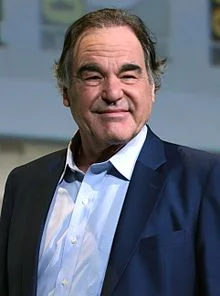
Oliver Stone
Oliver Stone is an award-winning filmmaker, screenwriter, and author. He is known for his provocative and politically charged films, which have earned him three Academy Awards and critical acclaim throughout his career. Stone's films often explore controversial topics and challenge mainstream narratives, with notable works including "Platoon," "JFK," and "Natural Born Killers." He is also the author of several books, including "A Child's Night Dream" and "Chasing the Light: Writing, Directing, and Surviving Platoon, Midnight Express, Scarface, Salvador, and the Movie Game." In addition to his filmmaking and writing career, Stone is a vocal advocate for political and social causes, including anti-war activism and government surveillance. His artistic vision and willingness to tackle challenging subjects have made him a leading voice in the world of cinema.
Books Mentioned on The Joe Rogan Experience (JRE) #1759 - Oliver Stone
Summary of The Joe Rogan Experience #1759 - Oliver Stone
In episode #1759 of the Joe Rogan Experience, Joe Rogan hosts a conversation with Oliver Stone, an acclaimed filmmaker, screenwriter, and author. Stone is known for his thought-provoking films that often challenge conventional narratives about American history and politics. The discussion delves into Stone’s creative process, his perspectives on politics, and the untold stories he has sought to bring to light through his work. This episode offers a fascinating exploration of the intersection between filmmaking, history, and political discourse.
Oliver Stone's Background and Work
The episode begins with Stone discussing his background, experiences in the film industry, and the inspiration behind some of his most famous films. Such as “Platoon,” “JFK,” and “Wall Street.” Stone shares his perspectives on the challenges of making films that challenge established narratives and provoke discussion on controversial topics. He also touches on his experiences working with legendary actors and the impact of his films on public perceptions of history and politics.
The Creative Process of Filmmaking
Rogan and Stone delve into the creative process of filmmaking. Exploring the various aspects of writing, directing, and producing a film. Stone discusses the importance of authenticity and attention to detail in crafting compelling stories. As well as the challenges of balancing artistic vision with the demands of the film industry. He also shares his thoughts on the evolution of the film industry and the impact of technology on storytelling and cinematic experiences.
Politics and the Untold Stories of American History
A significant portion of the conversation is dedicated to the intersection of politics and history in Stone’s work. Stone shares his perspectives on the untold stories of American history that he has sought to bring to light through his films. Such as the assassination of President John F. Kennedy and the Vietnam War. He discusses the importance of questioning established narratives and seeking the truth. Even when it challenges widely-held beliefs and assumptions.
The Role of Media in Shaping Public Opinion
Rogan and Stone explore the role of media in shaping public opinion. Particularly in relation to politics and history. They discuss the influence of mainstream media on public perceptions of events and the potential dangers of relying on a limited range of sources for information. Stone emphasizes the importance of independent journalism, critical thinking, and seeking diverse perspectives in order to form well-informed opinions.
The Impact of Stone's Films on Public Discourse
The conversation touches on the impact of Stone’s films on public discourse. With Rogan and Stone discussing the ways in which his work has provoked debate and challenged conventional wisdom. They examine the role of art and film in fostering dialogue on important issues and the potential for films to serve as a catalyst for change. Stone shares his thoughts on the responsibility of filmmakers to tell compelling stories that explore complex issues and challenge the status quo.
Censorship and the Challenges of Tackling Controversial Topics
Rogan and Stone discuss the challenges of tackling controversial topics in film, including the potential for censorship and backlash. Stone shares his experiences of facing resistance and criticism for his work, and the importance of standing by his artistic vision in the face of adversity. They also touch on the potential for self-censorship and the need for artists to remain true to their creative instincts, even when faced with external pressures.
The Future of Filmmaking and Storytelling
As the conversation progresses, Stone shares his thoughts on the future of filmmaking and storytelling, discussing the potential for new technologies and platforms to transform the way stories are told and consumed. He also reflects on the role of filmmakers in an increasingly interconnected and globalized world, and the importance of continuing to explore diverse perspectives and untold stories.
Conclusion
Overall, the conversation between Joe Rogan and Oliver Stone in episode #1759 is a must-listen for anyone interested in filmmaking, politics, and the untold stories of American history. The insights and perspectives shared throughout the episode provide a valuable understanding of the challenges and opportunities facing filmmakers today and the importance of using art to explore complex issues, challenge the status quo, and foster dialogue on important topics.









